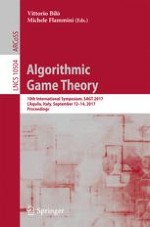2017 | OriginalPaper | Buchkapitel
Hedging Under Uncertainty: Regret Minimization Meets Exponentially Fast Convergence
verfasst von : Johanne Cohen, Amélie Héliou, Panayotis Mertikopoulos
Erschienen in: Algorithmic Game Theory
Aktivieren Sie unsere intelligente Suche, um passende Fachinhalte oder Patente zu finden.
Wählen Sie Textabschnitte aus um mit Künstlicher Intelligenz passenden Patente zu finden. powered by
Markieren Sie Textabschnitte, um KI-gestützt weitere passende Inhalte zu finden. powered by
